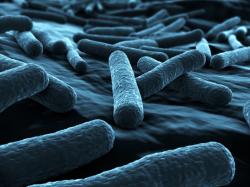Treatments That Reduce E. Coli O157:H7 Also Effective Against Non-O157:H7 STEC, S. Newport & S. Typhimurium
December 28, 2011 | 2 min to read

Washington, D.C. –Decontamination treatments that reduce Escherichia coli O157:H7 contamination on beef trimmings also reduce non-O157 Shiga toxin-producing E. coli (STEC), and multiple drug resistant (MDR) and susceptible Salmonella Newport and Salmonella Typhimurium, according to recent AMIF-funded research conducted by Colorado State University researchers.
Published studies have evaluated the antimicrobial effects of various chemical decontamination treatments for beef trimmings. However, most previous studies used E. coli O157:H7 as the target pathogen.
“Overall, the findings presented in this report on the effectiveness of chemical decontamination treatments for beef trimmings against E. coliO157:H7, non-O157 STEC serotypes, and antibiotic susceptible and resistant S. Newport and S. Typhimurium should be useful to regulatory authorities and the meat industry as they consider these pathogens in beef trimmings” said study author John Sofos, Ph.D.
Studies were conducted to evaluate the antimicrobial effects of chemical decontamination treatments against E. coli O157:H7, six non-O157 STEC serotypes (O26, O45, O103, O111, O121, and O145), and antibiotic susceptible and resistant (MDR and/or MDRAmpC) phenotypes of S. Newport and S.Typhimurium inoculated on beef trimmings. Individual strains or mixtures were evaluated.
The antimicrobial treatments evaluated were lactic acid (5 percent, at 25 or 55°C), acidified sodium chlorite (0.1 percent), peroxyacetic acid (0.02 percent), sodium metasilicate (4 percent), Bromitize Plus (225 ppm active bromine), SYNTRx 3300 (pH 1.0), and AFTEC 3000 (pH 1.2).
Findings indicated that the antimicrobial effects of these decontamination treatments against the non-O157 STEC serotypes and S. Newport/Typhimurium antibiotic resistance phenotypes were generally the same as those against E. coli O157:H7.
“This study illustrates that existing industry practices are controlling all STEC, not just E. coli O157:H7,” said AMI Foundation President James H. Hodges. “From a scientific perspective, in-plant interventions do not discriminate; they target E. coli strains broadly.”
The findings of this study were presented by Sofos during his presentation,“The Science and Purpose of Laboratory Challenge Studies” at the symposium on“Validation of Enteric Pathogen Interventions: Scientific, Regulatory and Applied Approaches for Beef Slaughter and Further Processors” presented at the 98th Annual Meeting of the International Association for Food Protection.
The final report is available at http://www.amif.org/research/10-119/.
The American Meat Institute Foundation is a non-profit research, education and information foundation established by the American Meat Institute to study ways the meat and poultry industry can produce better, safer products and operate more efficiently.
Source: American Meat Institute Foundation
